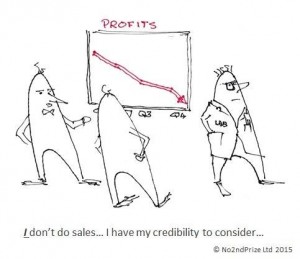Who does Sales?
 For SMEs in particular, deciding who does sales and is responsible for winning new business is one of the most important decisions. Yet often as the business develops “marketing” simply grows organically with no real plan. Sometimes, the people who enjoy it or are willing to take it on, do it – probably as part of their “main” activity.
For SMEs in particular, deciding who does sales and is responsible for winning new business is one of the most important decisions. Yet often as the business develops “marketing” simply grows organically with no real plan. Sometimes, the people who enjoy it or are willing to take it on, do it – probably as part of their “main” activity.
Deciding how to allocate responsibility for sales is a critical part of developing a profitable business. Many people – even entrepreneurs – find the thought of sales a bit daunting, if not even slightly dirty and demeaning. This is particularly true of engineers and researchers, yet these people are often the best marketers.
So, have a think about the four key points in this section and see if it helps you decide how to organize sales. If it doesn’t work, you can always change later, so don’t worry!
Sales Organization Considerations
- Sales is an investment (mainly in people’s time). How much are you willing to invest to secure your future? Great plans without resources are just wish-lists. But investing time without also investing in process and skills development is a waste of money. Even if people have “the aptitude”, they still need to develop the skillsets.
- Plan your sales approach. Do you plan full-time sales people or is it a scheduled part of some people’s jobs? There is a school of thought that states everyone in a business is part of the sales team. If people have a role, they need to be able to deliver a result – that means time and training.
- Use your technical experts! Whatever you do, you have people who really understand it. Yet, if you tell these people they should be doing sales, they often hate it. The trick is to split up the process, so they can focus on helping the customer learn how your offerings are better than your competitors’. Once again, providing the skillsets (in a non-pressured but fun way) reaps great dividends.
- Consider Account Management – often, it simply doesn’t work for SMEs; it is too big an investment, over too long a period. It doesn’t have to be “all or nothing”, though. Two or three senior people with a remit to deepen engagement with one or two major customers each can make an incredible difference and help a SME punch way above its weight.

 No2ndPrize
No2ndPrize